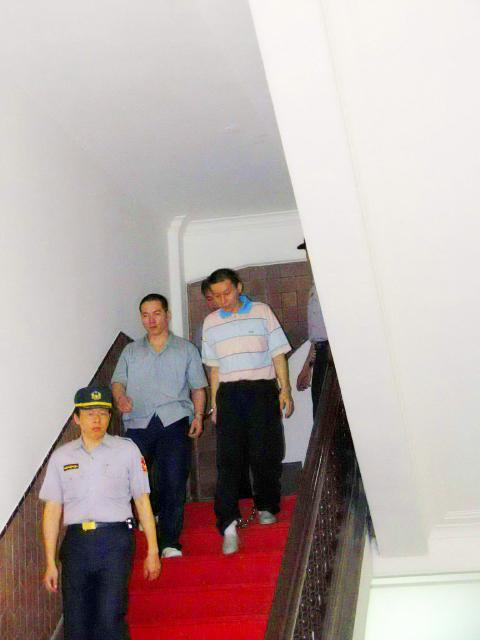The Supreme Prosecutors’ Office yesterday filed an extraordinary appeal against convicted murderer Wang Hung-wei’s (王鴻偉) death penalty, saying that he has shown remorse and is a good prospect for rehabilitation.
Wang was sentenced to death in 2009 for stabbing 20-year-old Chang Ya-ling (張雅玲) to death on Sept. 26, 2000. Wang, who was 30 at the time of the murder, had been stalking Chang after she turned down his advances, and on the night of the murder he knocked Chang unconscious with his car and then took her to a remote location where he stabbed her 176 times in the neck.
The office said that Wang was driven to murder by “loss of love,” which it said was different from premeditated murder, adding that the court failed to investigate whether there was a chance of Wang’s rehabilitation.

Photo: Sun Yu-lien, Taipei Times
Prosecutor-General Yen Ta-ho (顏大和) on Friday last week filed an extraordinary appeal on Wang’s behalf, it said.
The decision was made after a discussion regarding the police investigation report, adding that no evidence was found of intent, propensity toward murder, sexual addiction or any other “base” motivation on Wang’s part, Yen said.
Wang’s actions did not constitute extreme homicidal behavior, such as is exhibited in serial homicide cases, public mass murders and murders where victims are chosen without reason, Yen said.
The death penalty ruling did not conform with the UN’s International Covenant on Civil and Political Rights and the Safeguards Guaranteeing Protection of the Rights of those Facing the Death Penalty, Yen said.
Yen said that according to those guidelines “in countries that have not abolished the death penalty it should only be used for the most extreme offenses.”
The use of capital punishment in Wang’s case contradicts the usual practice of the Supreme Court and violates the principals of equality, Yen said.
Chang’s sister yesterday said that she was shocked to hear the news, as she did not expect the verdict to be appealed after 17 years, adding that the law now seems to protect criminals.
“Is rejection the same thing as ‘loss of love?’ Is putting a watermelon knife in one’s car not ‘premeditation’? Is a person who stabs someone 176 times able to be rehabilitated?” People First Party Deputy Secretary-General Liu Wen-hsiung (劉文雄) said on Facebook.
Liu expressed concern over the potential effects on Chang’s family and questioned the prosecutors’ sense of empathy.
Chinese Nationalist Party (KMT) caucus deputy secretary-general Lin Wei-chou (林為洲) said that filing an extraordinary appeal in Wang’s case is inappropriate, citing the multiple stab wounds and the intentional placing of the body in the parking lot where it was found.
Lin called Wang’s actions “savage” and “inhumane.”

Intelligence agents have recorded 510,000 instances of “controversial information” being spread online by the Chinese Communist Party (CCP) so far this year, the National Security Bureau (NSB) said in a report yesterday, as it warned of artificial intelligence (AI) being employed to generate destabilizing misinformation. The bureau submitted a written report to the Legislative Yuan in preparation for National Security Bureau Director-General Tsai Ming-yen’s (蔡明彥) appearance before the Foreign Affairs and National Defense Committee today. The CCP has been using cognitive warfare to divide Taiwanese society by commenting on controversial issues such as Taiwan Semiconductor Manufacturing Co’s (TSMC, 台積電) investments in the

INVESTIGATION: The case is the latest instance of a DPP figure being implicated in an espionage network accused of allegedly leaking information to Chinese intelligence Democratic Progressive Party (DPP) member Ho Jen-chieh (何仁傑) was detained and held incommunicado yesterday on suspicion of spying for China during his tenure as assistant to then-minister of foreign affairs Joseph Wu (吳釗燮). The Taipei District Prosecutors’ Office said Ho was implicated during its investigation into alleged spying activities by former Presidential Office consultant Wu Shang-yu (吳尚雨). Prosecutors said there is reason to believe Ho breached the National Security Act (國家安全法) by leaking classified Ministry of Foreign Affairs information to Chinese intelligence. Following interrogation, prosecutors petitioned the Taipei District Court to detain Ho, citing concerns over potential collusion or tampering of evidence. The

‘COMPREHENSIVE PLAN’: Lin Chia-lung said that the government was ready to talk about a variety of issues, including investment in and purchases from the US The National Stabilization Fund (NSF) yesterday announced that it would step in to staunch stock market losses for the ninth time in the nation’s history. An NSF board meeting, originally scheduled for Monday next week, was moved to yesterday after stocks plummeted in the wake of US President Donald Trump’s announcement of 32 percent tariffs on Taiwan on Wednesday last week. Board members voted to support the stock market with the NT$500 billion (US$15.15 billion) fund, with injections of funds to begin as soon as today. The NSF in 2000 injected NT$120 billion to stabilize stocks, the most ever. The lowest amount it

NEGOTIATIONS: Taiwan has good relations with Washington and the outlook for the negotiations looks promising, Minister of Economic Affairs J.W. Kuo said Taiwan’s GDP growth this year is expected to decrease by 0.43 to 1.61 percentage points due to the effects of US tariffs, National Development Council (NDC) Minister Paul Liu (劉鏡清) said at a meeting of the legislature’s Economics Committee in Taipei yesterday, citing a preliminary estimate by a private research institution. Taiwan’s economy would be significantly affected by the 32 percent “reciprocal” tariffs slapped by the US, which took effect yesterday, Liu said, adding that GDP growth could fall below 3 percent and potentially even dip below 2 percent to 1.53 percent this year. The council has commissioned another institution